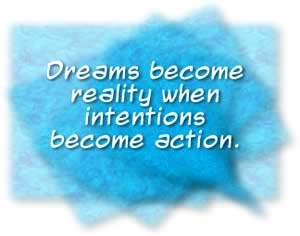Turning Motivation Into Action
Have you ever noticed that nearly everywhere you turn, someone is trying to sell us on the importance of motivation? The message seems to be: If you have it, you’re in the driver’s seat. If you don’t, you’re screwed. From graphics on Pinterest to ads in magazines and on TV, everyone is selling … no, demanding … the need for motivation. But can we achieve our goals by just being motivated? What about action? Who is selling behavior change?
Several weeks ago, I picked up some take-out from my favorite local stir-fry joint. (It’s my regular go-to when I haven’t made it to the grocery store or don’t have time to cook.) When I finished my meal and opened my fortune cookie, I sat there staring at the message before me. That’s when it dawned on me: It’s not about being motivated; it’s about being the master of every situation.

Motivation is important. It means we have a desire or willingness to do something – like run, go to the gym or choose a salad (with healthy dressing) over a double cheeseburger. But we can have a desire to do something and still choose not to do it, right? To make it real, we have to act. We have to choose to run or go to the gym or eat the healthy option every day … when we feel like it and when we don’t. Everything is a choice. Some choices are easy and some are really, really hard. But we ultimately have the power to choose to act on our motivation. To be the master of every situation.

So how can we make sure to turn our motivation into action? Last week, I was fortunate to attend a leadership development seminar that focused on behavior change. Stanford University’s Persuasive Tech Lab created a list of the top mistakes people make when it comes to behavior change.* Even though it was supposed to relate to behaviors in a workplace setting, all I could think about was how true it was for exercise and running.
The next time you start thinking about what motivates you to get out there and get moving, consider these provocative reminders, inspired by Stanford’s list with a rUnladylike twist.
How to turn motivation into action: 7 DOs and DON’Ts
- DON’T attempt big leaps when you should be taking baby steps. This reminds me of the first week in January each year when the gym crowds to near capacity and then is empty again by February. When we want to start doing something, like exercise more or eat healthier, it’s easy to take on too much too soon. It’s easy to set lofty goals that may not be realistic. DO seek tiny successes, one after the other. It is the small victories that will lead to lifestyle change. We can’t only celebrate the big successes, like running our fastest pace ever or losing 5 pounds. We must also seek out and celebrate the small things that start to add up, like planning your meals for the week on a Sunday, going for a run even after a long day, simply getting up in the morning to move.
- DON’T ignore how environment shapes your behavior. Maybe you have the best of intentions to exercise after work each day, but when you come home you get distracted with the million other things to do around the house and never make it to the gym. Or maybe your spouse has a pantry full of junk food, and even though you don’t want it, you give into that bag of Doritos instead of cooking the quinoa sitting right next to it. DO change your context to change your life. Removing things from your everyday environment that are going to trigger poor choices will help prevent you from making them. Pack a bag with your exercise gear and bring it with you to work so you can go straight to the gym from the office. Talk to your spouse about keeping the foods that tempt you the most out of the pantry. Give yourself the chance to succeed easier.
- DON’T try to stop old behaviors when you should be creating new ones. One of my problems when it comes to fitting everything into the day is that I stay at work too late too often. That means I typically don’t start my workouts until 7 or 8 p.m., when my brain is fried, I’m exhausted and my heart isn’t always in it. Instead of trying to leave work early (thus leaving important tasks unfinished) so that I can make my workout schedule easier, I’ve been creating a new behavior: Getting up and exercising in the morning BEFORE work. DO focus on action, not avoidance.
- DON’T believe that information leads to action. Just because you know something; it doesn’t mean you will do it. Only action leads to action. DO turn what you know into what you choose to do about it.
- DON’T focus on abstract goals. An abstract goal is something like, “I want to get in shape.” That’s a big lofty desire and it could mean lots of different things. It’s also so broad that you could find yourself interpreting it in many ways. Even in ways that are less likely to get you to that goal. Instead, DO focus on concrete behaviors. Set specific behaviors, such as: “I am going to jog 15 minutes 4 days a week,” or “I will incorporate one yoga class into my training schedule one day per week.”
- DON’T seek to change a behavior forever. Lately I’ve been wanting to try to eat cleaner, meaning eating unprocessed foods and only things containing ingredients I can actually pronounce. Even though I eat healthy most of the time, I still love my Clif Bars, Greek yogurt with fruit pre-mixed in, etc. And all of that stuff has processed ingredients. In thinking about changing my behavior, that would involve taking extra time to cook lots of things from scratch … blend my own fruit with plain Greek yogurt, make my own protein bars with fruit, nuts, oats, etc., make all my own soups … you get the point. Saying that I want to make this change in totality is like setting myself up to fail. DO define behaviors with a set time period. Instead of saying I’m going to stop eating processed foods, setting a goal to do so for a week and see how it goes feels more doable. Then I can build from there. I’m more likely to adopt the behavior if it isn’t dependent on now until eternity, with no room to learn and grow. [Be on the lookout for a post about this challenge coming soon!]
- DON’T blame failures on lack of motivation. DO make the behavior easier to do. Be the master of every situation you find yourself in. Create opportunities in your everyday environment to want to make the right choice in those situations. Give yourself the opportunity to succeed, but also have a plan for when you fall of the wagon so you know how to get back on.

*Source: Top 10 Mistakes in Behavior Change by BJ Fogg, Kara Chanasyk, Margarita Quihuis, Neema Moraveji, Jason Hreha, Mark Nelsonat
How do you turn your motivation into action? What change(s) have you made to your environment or your situation to make your desired behaviors easier to achieve? Do you believe you are the master of every situation?



Comments
Great tips. I am terrible at starting small, and it’s something I have to remind myself daily. Sometimes I’m not the master, and I always feel uncomfortable when that happens. I usually sit down and nut it out for awhile, and often I find that if I take one small step, things begin to fall into place.
Thanks, Kate! Setting goals and making a plan to follow through with them can be really tough, especially when it comes to exercise and fitness. We have big lofty desires and the best of intentions of meeting them, but it is easy to get derailed. Starting small and celebrating our small victories is key, I think. You are doing a great job. Keep it up!
Great post! I’ve tried to make more meals at home but with that also dirtys up a kitchen. I’m with you on trying to eat cleaner. If I make just one new recipe a week, I feel as if I’m doing pretty well. I’m cooking for a picky family that doesn’t eat vegetables. This has been a major mountain to climb and I’m still climbing. Sometimes, I do give up but NEVER give in.
Thank you, Tracy! I love that you will never give up! That is more powerful than any temptation or challenge!
Have you read the poem Invictus? The last two lines sum up challenges for me
I am the master of my fate;
I am the captain of my soul.
This was the poem in the movie by the same name, which from Wikipedia
While incarcerated on Robben Island prison, Nelson Mandela recited the poem to other prisoners and was empowered by its message of self mastery. In the movie Invictus, Mandela gives the captain of the national South African rugby team the poem to inspire him to lead his team to a Rugby World Cup win, telling him how it inspired him in prison
Pretty powerful and I keep it over my desk to remind that I am in charge of me.
Love your list, may end up there too:)
Thank you for sharing this poem, Kevin. It is powerful. I love your quote: “I am in charge of me.” Good stuff! Thank you!
thanks alot for this post ,my biggest weakness is that i tried to do big everytime and getting failed very soon but right now i am learning the art of getting started with small tasks.thanks once again.